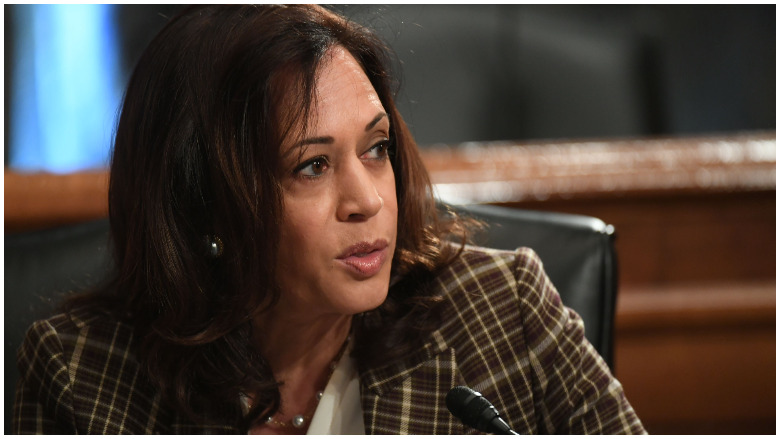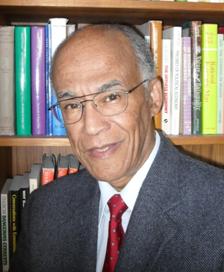
U.S. Senator and vice presidential candidate Kamala Harris accomplished a historical first when Joe Biden chose her as his vice presidential running mate. Is she Black? Yes, but her ancestry is also Indian. She would be the first Black woman and the first Indian woman to serve as vice president and is the first on a national ticket.
Harris has defined herself as a “Proud American. I am who I am.” However, CNN reports how, in her autobiography, Harris described how her Indian mother helped Harris and her sister grow “into confident, proud Black women.” The Washington Post reports that her parents are Jamaican and Indian immigrants.
Harris wrote that her Indian-born mother “understood very well that she was raising two Black daughters. She knew that her adopted homeland would see Maya and me as Black girls, and she was determined to make sure we would grow into confident, proud Black women.” The Post told a similar story, describing Harris’s mother as “a Hindu immigrant single mom who adopted black culture and immersed her daughters in it. Harris grew up embracing her Indian culture, but living a proudly African American life.” Harris attended a historic black college, Howard University.
Her dad, Donald Harris, is a prominent economics professor who has spoken out critically about his daughter’s comments in the past on Jamaica.
Kamala’s mother is named Shyamala Gopalan, and she was born in India. According to the Mercury News, Harris often speaks about her parents’ immigrant experiences. Her mother was a “breast cancer researcher from India who had a powerful presence despite her five-foot stature” and died in 2009 of colon cancer, the newspaper reported.
Here’s what you need to know:
Kamala’s Father, Donald Harris, Who Was Born in Jamaica, Is a Naturalized U.S. Citizen

Donald Harris, father of Senator Kamala Harris.
Donald J. Harris, a professor, was born in Jamaica and is a naturalized U.S. citizen, according to his Stanford University biography. You can find a list of his publications and articles here. He once wrote an article called, “Reflections of a Jamaican Father” for Jamaica Global Online.
In his article about being a Jamaican father, Donald Harris wrote, “To this day, I continue to retain the deep social awareness and strong sense of identity which that grassroots Jamaican philosophy fed in me. As a father, I naturally sought to develop the same sensibility in my two daughters. Born and bred in America, Kamala was the first in line to have it planted.”
In the article, Harris explained the family’s Jamaican roots, writing:
My roots go back, within my lifetime, to my paternal grandmother Miss Chrishy (née Christiana Brown, descendant of Hamilton Brown who is on record as plantation and slave owner and founder of Brown’s Town) and to my maternal grandmother Miss Iris (née Iris Finegan, farmer and educator, from Aenon Town and Inverness, ancestry unknown to me). The Harris name comes from my paternal grandfather Joseph Alexander Harris, land-owner and agricultural ‘produce’ exporter (mostly pimento or all-spice), who died in 1939 one year after I was born and is buried in the church yard of the magnificent Anglican Church which Hamilton Brown built in Brown’s Town (and where, as a child, I learned the catechism, was baptized and confirmed, and served as an acolyte).
According to the Institute for New Economic Thinking, “Donald J. Harris is best known for bringing Post-Keynesian economics (particularly the Kaleckian and Neo-Ricardian brand) into development economics.”
Kamala’s dad is an emeritus professor of economics at Stanford.
According to his Stanford biography, Donald Harris, at Stanford, “was a leader in developing the new program in Alternative Approaches to Economic Analysis as a field of graduate study. For many years he also taught the popular undergraduate course in Theory of Capitalist Development.”
One joke that Kamala made upset her dad. Kamala Harris was asked on the radio about whether she smoked pot when she was young. She joked, “Half my family’s from Jamaica, are you kidding me?” That comment upset her dad. He felt it was an unfair slam on the family’s Jamaican roots. In fact, he was so upset that he released a statement to a Jamaican news site to clear up the matter.
“My dear departed grandmothers (whose extraordinary legacy I described in a recent essay on this website), as well as my deceased parents, must be turning in their grave right now to see their family’s name, reputation and proud Jamaican identity being connected, in any way, jokingly or not with the fraudulent stereotype of a pot-smoking joy seeker and in the pursuit of identity politics,” he wrote, according to Politico.
Added Donald Harris: “Speaking for myself and my immediate Jamaican family, we wish to categorically dissociate ourselves from this travesty.”
Kamala’s Mother Showed Kamala the Importance of Public Service
Kamala Harris’s mother, Shyamala Gopalan, “emigrated from Chennai, India, to come to the University of California-Berkeley to pursue a doctorate in nutrition and endocrinology,” reports Mother Jones.
In 2017, Harris wrote on Facebook, “On the last day of Women’s History Month I want to recognize my mother, Shyamala Harris. My mother was born in India and came to the United States to study at UC Berkeley, where she eventually became an endocrinologist and breast-cancer researcher. She, and so many other strong women in my life, showed me the importance of community involvement and public service. #WomensHistoryMonth.”
Her Jamaican-raised father met Shyamala in college. She was supposed to “return to India and an arranged marriage,” but she married Donald instead, the magazine reports. According to the Mercury News, Gopalan “was the precocious daughter of an Indian diplomat and a women’s rights activist in the southeastern state of Tamil Nadu.”
Kamala also has a sister named Maya. Donald and Shyamala divorced when Kamala was 7. According to the San Francisco Chronicle, when she was 12, “Harris moved from Berkeley because her mother accepted a research job in Canada. She graduated from high school there.” In between, the Chronicle reports, she was indeed, as she said in the first Democratic debate, “part of the second class to integrate Berkeley’s classrooms when she began school in 1969…Thousand Oaks Elementary School, in a well-off area in North Berkeley near Solano Avenue, was the school to which Harris was bused.” The Associated Press reported that “the school board didn’t agree to desegregate all 14 elementary schools until the beginning of the 1968 school year.” (See a fact check of Harris’s busing and integration claim here.)
READ NEXT: Remembering Summer Taylor, the Seattle Black Lives Matter Protester Struck by a Car at a Protest